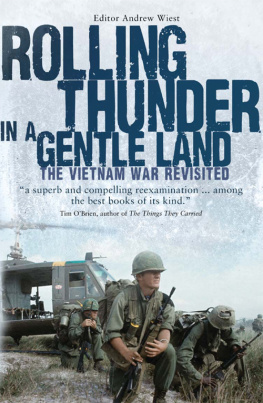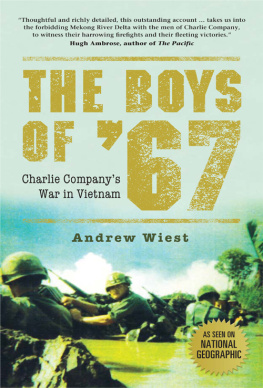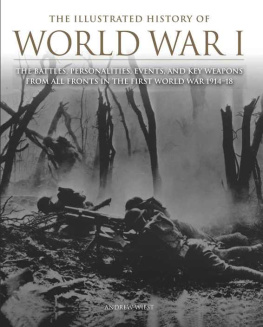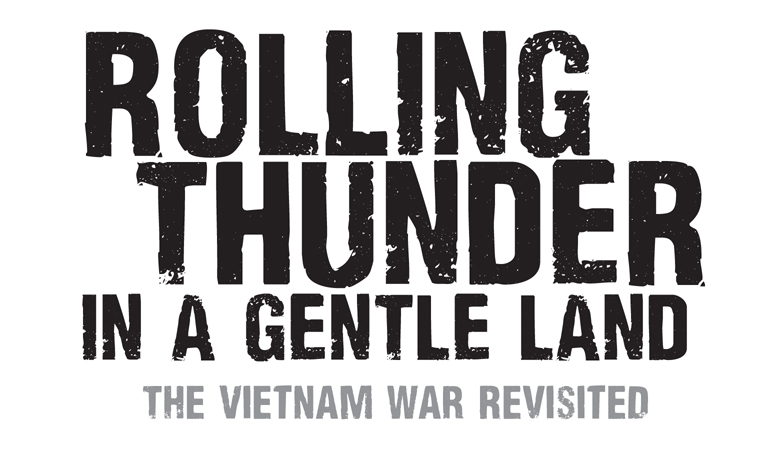Editor Andrew Wiest
This book is dedicated to my beloved children Abigail and Luke.
CONTENTS
ACKNOWLEDGMENTS
During my years studying the Vietnam War I have incurred many intellectual and physical debts that can never be fully repaid. First I would like to thank Anita Baker and Ruth Sheppard, the editors at Osprey, for dreaming up this project and for trusting me to take it to fruition. They have worked tirelessly, and were open to my suggestions about taking this project down a somewhat less than traditional road. I would also like to thank all of my colleagues at the University of Southern Mississippi for their continued support. At the risk of slighting some I would like to single out Charles Bolton, Phyllis Jestice, William Scarborough, Bradley Bond, Kyle Zelner, Mary Beth Farrell, Suzy Steen, and Michael Neiberg for special thanks. In one way or another they each made my life easier or served as sounding boards for this project. As usual our indispensable administrative assistant Shelia Smith was central to my success in so many ways. I completed this project while serving as a Visiting Professor in the Department of Warfighting Strategy at the Air War College. I would very much like to thank Colonel Stef Eisen, Lieutenant Colonel Jeff Hood, Dan Huges, Adam Cobb, Toshi Yoshihara, and the wonderful students of Seminar 16 for their friendship and help during this very enjoyable year. I also owe a debt of gratitude to the Vietnam veterans with whom I work. They brought me to the study of the Vietnam War and always serve both as my guides on my Vietnam journey and as my conscience. Though I work with so many veterans, again I will single out a few for special thanks: John Young, Courtney Frobenius, Tran Ngoc Hue, and Pham Van Dinh. Finally as always my thanks go out to my family, especially my wife Jill, for first instilling in me the desire to write and then allowing me the time to do so.
CONTRIBUTORS
Bui Tin was born in 1927 near Hanoi. At the age of 18, he joined Ho Chi Minhs revolution, fighting against both French and American troops and Pol Pots Khmer Rouge. He was in the VN Peoples Army from 1945 to 1982, and in the Communist Party of Vietnam from 1946 to 1990, and in 1975 he was a witness to the events of April 30 at the Independence Palace in Saigon. Following demobilization in 1982, Bui Tin became a defense and foreign affairs analyst for Nhan Dan, the Communist Partys official newspaper, and was named editor-in-chief of the Sunday edition of Nhan Dan in 1988. Tin began harboring doubts about communism, and on a visit to France in 1990 he elected to stay abroad to work for the restoration of freedom and democracy in Vietnam. While in exile in Paris, he has written several books including Following Ho Chi Minh (1999), Vietnam: La face cache du rgime (1999), and From Enemy to Friend: A North Vietnamese Perspective on the War (2002). He writes for many newspapers, and has participated in numerous conferences on the Vietnam War.
Professor Kenton Clymer, who received his Ph.D. from the University of Michigan, is a distinguished Research Professor in the History Department at Northern Illinois University. He is the author of six books, including a two-volume history of United States relations with Cambodia, The United States and Cambodia, 18721969: From Curiosity to Confrontation and The United States and Cambodia, 19692000: A Troubled Relationship (2004), which won the Robert H. Ferrell Book Prize from the Society for Historians of American Foreign Relations. He is currently writing a history of the United States relations with Burma.
Professor R. Blake Dunnavent received his BA from Abilene Christian University in 1990. He received his MA and Ph.D. degrees from Texas Tech University in 1998. His major field is American history, with a concentration on military and naval history. He joined the faculty at Louisiana State University in Shreveport in fall 2002. His publications include Brown Water Warfare: The U.S. Navy in Riverine Warfare and the Emergence of a Tactical Doctrine, 17751970 (2003).
Bernard Edelman served as a broadcast specialist/correspondent for the US Army in Vietnam in 1970. He co-curated one of the first exhibits of the artwork of veterans in 1981, and was named by Mayor Ed Koch to serve on the New York Vietnam Veterans Memorial Commission, for which he edited the volume Dear America: Letters Home from Vietnam. He was associate producer of the documentary feature film based on his book, and co-produced a documentary short, Memorial: Letters from American Soldiers, which was nominated for an Academy Award. He currently works for Vietnam Veterans of America.
Professor Ronald B. Frankum, Jr. earned his Ph.D. from Syracuse University. He was formerly archivist of the Vietnam Archive at Texas Tech University and is currently an associate professor and chair of history at Millersville University of Pennsylvania. He is author of Silent Partners: The United States and Australia in Vietnam, 19541968 (2001) and co-author of The Vietnam War for Dummies (2002), Like Rolling Thunder: The Air War in Vietnam, 19641975 (2005), Operation Passage to Freedom: The United States in Vietnam 19541955 (2007), and The Historical Dictionary of the War in Vietnam (2011).
Professor Jeffrey Grey is Professor of History in the School of Humanities and Social Sciences, University College, Australian Defence Force Academy in Canberra. He holds the degrees of Bachelor of Arts (Honors) from the Australian National University (1983) and Doctor of Philosophy from the University of New South Wales (1986). He is the author or editor of 22 books in the fields of Australian and comparative military history, and has published numerous articles, chapters, and reviews in these fields. In the academic years 200002 he held the Major General Matthew C. Horner Chair in Military Theory at Marine Corps University, Quantico. In early 2012 he was appointed foundation director of the Australian Centre for the Study of Armed Conflict and Society.
Professor Daniel C. Hallin is Professor of Communication at the University of California at San Diego. He holds a Ph.D. in Political Science from U.C. Berkeley. His books include The Uncensored War: The Media and Vietnam (1986), We Keep America on Top of the World: Television News and the Public Sphere (1994), and Comparing Media Systems: Three Models of Media and Politics (2004). The latter book received the Goldsmith Book Award of the Shorensein Center on Press and Politics, as well as the Diamond Anniversary Book Award of the National Communication Association.
Le Ly Hayslip spent her early life living through the horrors of war-torn Vietnam. She left the country and moved to the United States in 1970, where she still lives. Following a visit to Vietnam in 1986, she founded a non-profit relief organization that provided housing, education, and medical care for Vietnamese children and villagers. She is the author of two best-selling books, both memoirs: When Heaven and Earth Changed Places (1989) and Child of War, Woman of Peace (1992). In 1990, she received the PEN non-fiction prize for When Heaven and Earth Changed Places. The books have been made into the critically acclaimed film Heaven and Earth (1994) directed by Oliver Stone. She has received many honors for her charity and humanitarian work. She organizes and leads groups of US veterans and citizens on trips to Vietnam. She established the Global Village Foundation in 2000, which honors individuals and organizations for their humanitarian contributions and peace efforts. Her co-author











